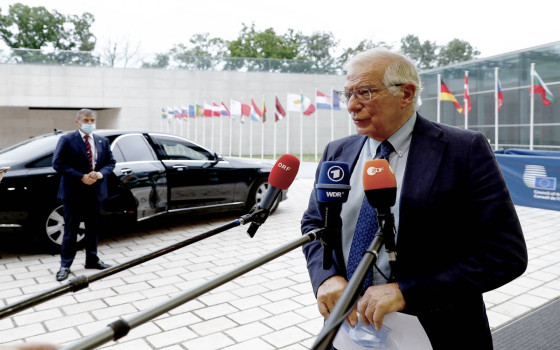
Brussels: Russia's invasion of Ukraine destroyed security in Europe and brought war back to it

- Europe and Arabs
- Friday , 2 December 2022 15:40 PM GMT
Brussels: Europe and the Arabs
European Union Foreign and Security Policy Coordinator Josep Borrell delivered a speech before the ministerial meeting of the member states of the Organization for Security and Cooperation in Europe, which was held in Poland.. Borrell began his speech by recalling that in 1975, the final Helsinki Act was signed. The following principles were agreed upon: [Rejection of the use of force, respect for sovereignty, territorial integrity, and protection of human rights and freedoms]. Borrell said these values are universal, not just Western.
Adding in his speech distributed in a statement issued in Brussels on Thursday evening: “Russia has not only violated the specific commitments of the Organization for Security and Cooperation in Europe (OSCE), but [also] the fundamental principles on which European security is built.
There can be no respect for OSCE values as long as Russia continues its war of aggression against Ukraine with the complicity of Belarus.
Russia brought the war back to Europe. Russia is now turning this into a purely punitive campaign, trying to inflict as much pain on Ukrainian citizens as possible, using winter as a weapon, putting them in the dark and cold. The Russian military deliberately targets the energy and water infrastructure that ordinary Ukrainians depend on.
The European Union's commitment to Ukraine's territorial integrity, security and freedom is unwavering. Let's be clear: Russia is engaged in an all-out war against Ukraine. We have to respond with full [Ukraine's] support.
The European Union and its member states have been at the forefront of efforts to show solidarity with the Ukrainian people. We have mobilized more than €19 billion in aid for Ukraine. Another €18 billion package has already been proposed for next year. Military assistance to the member states of the European Union is estimated at 8 billion euros.
Russia's war of aggression has effectively destroyed security in Europe. We are here to discuss how to address this situation and strengthen the OSCE in order to pave the way for the rebuilding of the European security architecture.
Apart from its brutal attack on Ukraine and its people, Russia continued to destabilize the two Georgian regions of South Ossetia and Abkhazia, the Transnistrian region of the Republic of Moldova, and seriously deteriorate the security situation in the entire OSCE region.
This is a historic opportunity to achieve a sustainable settlement of the conflict in the South Caucasus. We strongly encourage Armenia and Azerbaijan to seize this opportunity.
We similarly condemn Russia's systematic crackdown on human rights freedoms internally, and we also call on the Belarusian authorities to release all political prisoners and meet the people's demands for free and fair elections.
In this context, our contribution to the Ukraine Support Program is an opportunity to support the Organization for Security and Cooperation in Europe and to provide useful assistance to Ukraine. We have allocated 1.2 million euros for the OSCE's mine activities in Ukraine.
According to media reports, Borrell said, "We have confiscated about twenty billion euros from wealthy people close to power and people who support Russia, and we control about 300 billion of the financial resources of the Russian Central Bank." He emphasized at the OSCE ministerial meeting that "these funds should be used for the reconstruction of Ukraine."
Borrell concluded, "Let me reiterate once again our unwavering commitment to the OSCE and the values that this organization stands for."
With this in mind, I would like to wish every success to the next presidency of North Macedonia in 2023. You can count on the full support of the European Union in directing the organization.
In addition, Ukrainian Foreign Minister Dmytro Kuleba reiterated the call to discuss the feasibility of Russia remaining among the member states of the organization. He also renewed Kyiv's position regarding the necessity of "establishing a special court for crimes committed during the Russian aggression." Borrell had announced in a proposal to "provide support (for the establishment) of the International Criminal Tribunal for Russian war crimes in Ukraine," stressing that "it must be discussed and approved first by the member states of the European Union and then by the United Nations." The OSCE has 57 member countries, including Russia and Ukraine. Warsaw, which holds the rotating presidency of the organization this year, refused to allow Russian Foreign Minister Sergey Lavrov to enter its territory. This "provocative" decision was condemned by Moscow, which is represented in Lodz by its ambassador to the Organization for Security and Cooperation in Europe, Alexander Lukashevich.












No Comments Found